语言学conversational-implicature
试从术语学看implicature的汉译
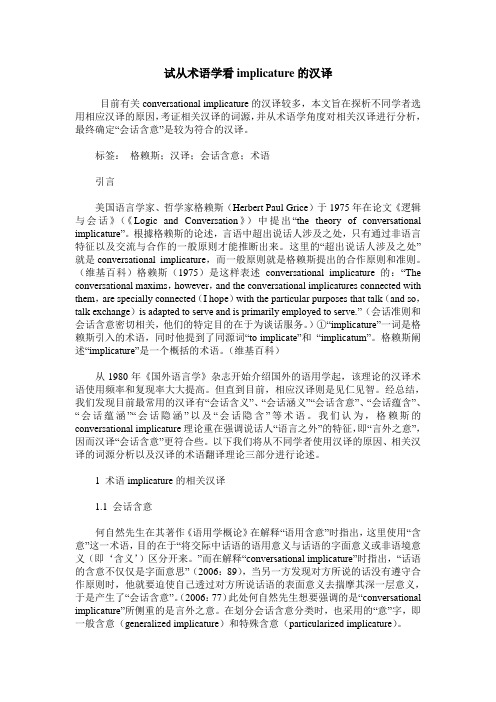
试从术语学看implicature的汉译目前有关conversational implicature的汉译较多,本文旨在探析不同学者选用相应汉译的原因,考证相关汉译的词源,并从术语学角度对相关汉译进行分析,最终确定“会话含意”是较为符合的汉译。
标签:格赖斯;汉译;会话含意;术语引言美国语言学家、哲学家格赖斯(Herbert Paul Grice)于1975年在论文《逻辑与会话》(《Logic and Conversation》)中提出“the theory of conversationa l implicature”。
根據格赖斯的论述,言语中超出说话人涉及之处,只有通过非语言特征以及交流与合作的一般原则才能推断出来。
这里的“超出说话人涉及之处”就是conversational implicature,而一般原则就是格赖斯提出的合作原则和准则。
(维基百科)格赖斯(1975)是这样表述conversational implicature的:“The conversational maxims,however,and the conversational implicatures connected with them,are specially connected(I hope)with the particular purposes that talk(and so,talk exchange)is adapted to serve and is primarily employed to serve.”(会话准则和会话含意密切相关,他们的特定目的在于为谈话服务。
)①“implicature”一词是格赖斯引入的术语,同时他提到了同源词“to implicate”和“implicatum”。
格赖斯阐述“implicature”是一个概括的术语。
(维基百科)从1980年《国外语言学》杂志开始介绍国外的语用学起,该理论的汉译术语使用频率和复现率大大提高。
Conversational Implicature 会话含义

Definition
• In 1967, American philosopher Grice put forward the Cooperative Principle: “Make your conversational contribution such as is required, at the stage at which it occurs, by the accepted purpose or direction of the talk exchange in which you are engaged” (Hu, 2001, p. 282-283). • And in order to further explain the Cooperative Principle, Grice divided it into four categories of maxims: the maximum of quantity, quality, manner and relation.
Levinson's three principles of CI
• Quantity Principle • Information Principle • Manner Principle RULE: Q>M>I
Conversational Implicature
The Cooperative Principle Neo-Gricean pragmatics
Mao Yan
The Cooperative Principle
In the process of understanding a conversation, it needs the interlocutors' common sense, shared knowledge, and inferential capability. Besides, cooperation is a key principle in communication.
Conversational_Implicature__会话含义_
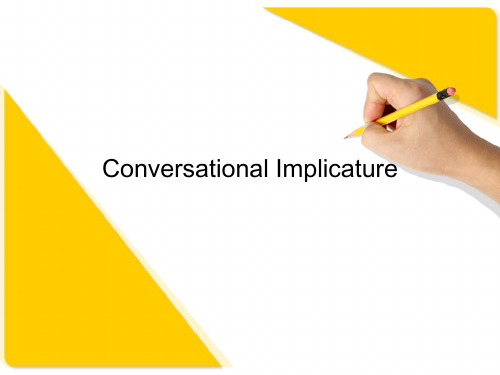
U →由语言符号构成的话语
Z →粗略地代表在听话人那儿产生的信仰或意志力, 或作出的反应。 Grice 的“非自然意义理论”实际上是一种交际理论 ( a theory of communication)。
2.2 Conversational Implicature Unlike conventional implicatures, conversational implicatures are produced by relating to the conversational context. To know what people mean, we have to interpret what they say. But interpretation is a tricky affair, and misunderstandings are always possible. As Leech remarks, ‘interpreting an utterance is ultimately a matter of guesswork’. e.g. A: When is Tom’s birthday? B: It’s sometime in October. B’s implicature: the only thing he remembered about Tom’s birthday was the month in which it occurs, and that he honestly didn’t know whether it was at the beginning, the middle or the end of that month.
the sunset.
The capital of France is Paris and the capital of England is London.
Chapter 7Conversational Implicature

• 但在现实交际中,人们出 于种种原因,并不都严格 地遵守合作原则及其相 关准则.因而就产生了会 话含义。
Flouting the Maxim of quality(说自知是 虚假的话;说缺乏足够证据的话)
• Many figures of speech like irony, metaphor, hyperbole, rhetorical questions and etc.belong to this kind of flouting.eg: He is made of iron.(metaphor) Women are tigers. • The obvious false statement:no human beings are made of iron.No women are tigers. • Its implicature is he has characteristics like iron like hardness, non-flexibility, durability.
(Flouting the maxim of quality) Cal:I had hoped you would come to me last night Rose:I was tired~~~I'm your fiancee Cal:My fiancee! My wife in practice, if not yet by law. So you will honor me~~~
4.2 Cooperative Principle
• Grice introduces Cooperative Principle (CP) in his book Logic and Conversation 《逻辑与会话》in 1975 • 在格赖斯看来,要使交谈顺利进行,就要 求交谈参与者共同遵守一般原则,即在参 与交谈时,要使你说的话符合你所参与交 谈的公认目的和方向。
英语语言学概论会话含义.合作原则.翁京京
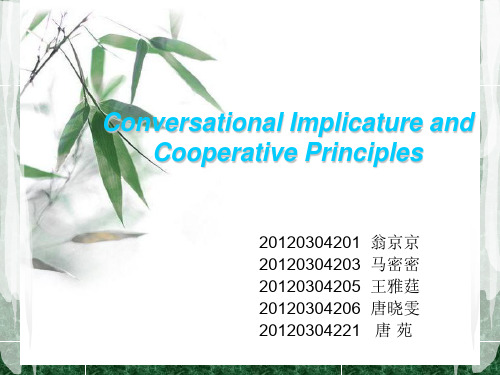
Four Principles
1.数量原则(maxim of quantity) 2.质量原则(maxim of quality) 3.相关准则(maxim of relation) 4.方式原则(maxim of manner)
A.数量准则(maxim of Quantity) 1) Make your contribution as informative as required. 2) Do not make your contribution more informative than is required say what you believe to be false. 2) Do not say that for which you lack adequate evidence.
C.关系准则 (maxim of Relevance) Be relevant
2)提供的信息太多 A: When did you come back last night B: Around midnight, we finished the meeting.
B. Violation of quality
1)故意不说真实的话 A:How are you? B: I am dead.
Conversational Implicature
• 话语的隐含意义,即“会话含义” • “会话含义”是语用学的核心内容。格莱斯的会
话含义理论,“本质是关于人们如何运用语言的 理论”。
generalized conversational implicature
• 不需要特殊语境就能推导出来的含义
Thank you!
Make your conversational contribution such as required at the stage at which it occurs by the accepted purpose or direction of the talk exchange in which you are engaged.
(完整版)语用学-5--Conversational-implicature
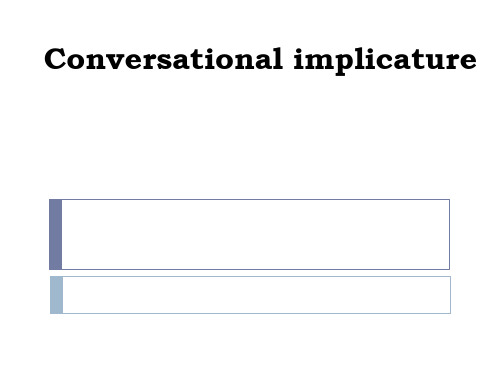
1. What is an implicature? E.g. A: I have a fourteen year old son. B: Well, that's all right. A: I also have a dog. B: Oh, I'm sorry.
Conversational implicature
Divergence in meaning: Formal devices VS. natural L Formalist VS. informalist Construct an ideal L Inadequte attention to the nature and
E.g. The duck ran up to Mary (p) and licked her (qBut this is not always true in real life as in the above example. Whenever p & q is true, it logically follows that q & p is true:
The logical representation of conjunction: p & q
This logical expression stands for: if p is true and q is true, then p & q is true. If either p or q is not true (i.e. false), then the conjunction of p and q is necessarily false.
B means more than what he or she says, but A can understand it or interpret it well in the context. How does this happen? How does the hearer get from what is said to what is meant, from the level of expressed meaning to the level of implied meaning.
语言学The Theory of Conversational Implicature

Content
• • • • Violation of the Maxim of Quantity Violation of the Maxim of Quality Violation of the Maxim of Relation Violation of the Maxim of Manner
Violation of the Maxim of Relation
· be irrelevant
• A: What time is it? B: The mail has already come. • A: What do you intend to do today? B: I have a terrible headache.
Content
• 8.2.1 The Cooperative Principle (CP) • 8.2.2 Violation of the Maxims • 8.2.3 Characteristics of Implicature
8.2.1 The cooperative Principle (CP)
• To specify the CP further, Grice introduced
four categories of maxims as follows: • Quantity:(数量准则) • Quality:(质量准则)
• Relation(关系准则) • Manner(方式准则)
Quantity
2. Not be brief
A: Did you get my assignment?
B: I received two pages clipped together and
covered with rows of black squirrels.
conversational implicature

Four Maxims of Cooperative Principle
• • • • Quantity Maxim Quality Maxim Relation Maxim Manner Maxim
Quantity Maxim
• 1. Make your contribution as informative as is required (for the current perpose of the exchange). • 2. Do not make your contribution more informative than is required. • Michael has four dictionaries. • Michael has five, six or even more dictionaries.
"Good night"
• Father: I think I'll go downstairs to say "good-night" to Nancy's boyfriend. He has been here long enough. • Mother: Now, George, don't you forget how we were when we were young? • Father: That does it! Out he goes!
Four types of violation-1
• 1. The speaker deliberately violates cooperative principle without making the hearer realize it. (e.g. telling lies; being less informative) • 2. The speaker explicitly tells the hearer that he is unwilling to cooperate. Eg. I don't want to talk about it now.
conversational implicature课件
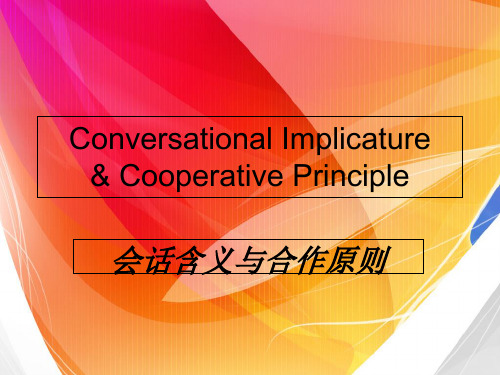
Levinson,1983:99
• “Natural language expressions do tend to have simple, stable and unitary(单一的) senses (in many cases anyway), but that this stable semantic core often has an unstable, context-specific pragmatic overlay-- namely, a set of implicatures."
Categories of Implicature
examples for implicature
• 1. She is a new hand here; therefore she turns up on time. (conventional)
• 2. John often dines out with a woman. (generalized, conversational)
• 3. where is the ice-cream? The kids and their pals had a party here last night. (particularized conversational)
• 4. Do you want to wash your hands? (nonconversational, non-conventional)
Quality Maxim
• Try to make your contribution true: • 1) Do not say what you believe to be false. • 2) Do not say that for which you lack
Conversational Implicature 会话含义

The Cooperative Principle
• The maxim of quantity: • 1. Make your contribution as informative as required (for the current purpose of the exchange); • 2. Do not make your contribution more informative than required. • The maxim of quality: • 1. Do not say what you believe to be false; • 2. Do not say that for which you lack adequate evidence.
The Cooperative Principle
• The maxim of manner: • Be perspicuous, and specifically; • 1. Avoid obscurity; • 2. Avoid ambiguity; • 3. Be brief (avoid unnecessary prolixity); • 4. Be orderly. • The maxim of relation: • Make your contribution relevant.
• Metaphor draws the most attention and interest among the figures of speech from scholars, since: 1. Its long history; 2. Grice: Metaphor can be treated as a special CI (from pramatics to explain metaphor), which is critisized as over simplify the issue and can only provide partial criterior for the illustration of metaphor; 3. It's complexity: the cooperation of semantics, pramatics, and psychology (the psychological basis of metaphor is to establish the assosiation of similarities of two things). e.g. : (Hu, p.165) a. We were on the same boat. b. Freud lived here.
语用学 5 Conversational_implicature

How
is it possible for the speaker and the hearer to understand each other? B means more than what he or she says, but A can understand it or interpret it well in the context. How does this happen? How does the hearer get from what is said to what is meant, from the level of expressed meaning to the level of implied meaning.
Grice (1975) published an article "Logic and conversation" which raises the question how it is possible for a theory to deal with the fact that natural language utterances do not convey the same meaning that the corresponding logical proposition would. He made an attempt to offer a solution: The philosopher's assumption that natural language expressions diverge from the formal devices of the logicians is wrong. In other words, natural language expressions cannot be fully explained by formal logic.
Chapter 3 Conversational__ Implicature
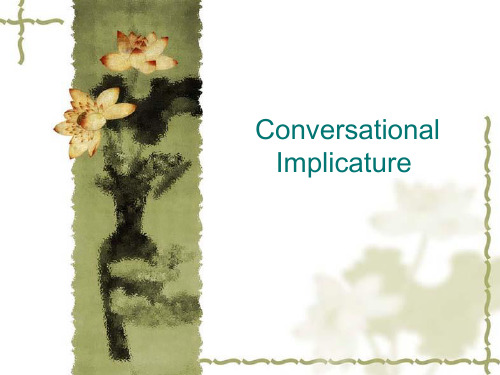
Types of implicature
meaning-nn what is said what is implicated
conventionally
generalized
conversationally
particularized
Huang1994, 2009:57 Davis 1998
Those spot meant measles. Those spot meant measles, but he hadn‟t got measles. (Semantically anomalous) 格赖斯指出自然意义和非自然意义的区别可用逻辑 方法把握。 当x means p表达的是自然意义时, x means p为真, p就为真,它们之间有一种逻辑蕴含关系。
Levinson(1983:128-129)认为 “however, moreover, besides, anyway”等起连接作用的词, “sir, madam, mate, your honour”等称呼语 都有常规意义。
Characteristics/properties of conventional implicature: 与会话含义相同的特点: 不是真值条件意义,不是明说的一部分。 与会话含义完全不同的特点: 1. 常规含义不具备可取消性(non-cancelability); 2. 常规含义是可分离的(detachability); 3. 常规含义是确定性的(determinacy); 4. 常规含义不需要推导(non-caculability); 5. 常规含义是规约性的(conventionality)。
The essence of meaningnn is that it is communication which is intended to be recognized as having been intended. Meaningnn is a matter of expressing and recognizing intention.
语言学 5.Con. Implicature I
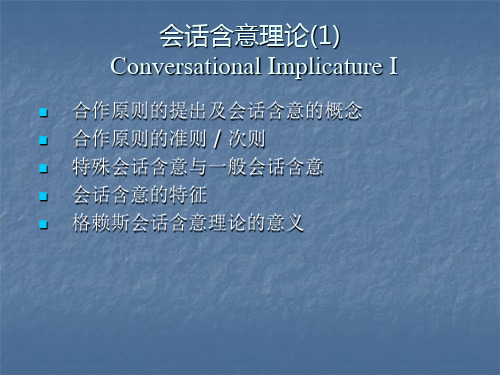
特征
Cancellability / Defeasibility 可消除性: 比如三个孩子可达到某一标准(我有…其实还不止三个…) Undetachability 不可分离性: “他见钱眼开” “他视财如命” “他简直节约到家了” “He’s a nice man.” “What a man!” “Such a nice man he is.” (在特定语境中的含意不变。) Inferability / Caculability 可推导性: 黑桃差不多全了。(黑桃没全。循合作原则推导) Did you finish that report? I started it (I didn’t finish the report.) Indeterminacy 不确定性 A: What do you think of Peter? B: He is a machine. ( hard-working, indifferent, precise about what he does etc.)
规约含意:语义层面的含意
个别词语和表达是否具有“含意”的属性?肯定的回答引 申出规约含意(conventional implicature)的概念。特点为: 不可消除 可分离(与词语有约定俗成的联系) 不可推导(不需合作原则的帮助进行推导) 22. She is poor but honest. (“对照”意不可消除) ?She is poor but honest, and there is no contrast between those two facts. 23. 东边日出西边雨。(有晴/情 无晴/情) 南部有雨,北部晴天。(含意分离) 24. 您是我的先生。(社会地位高) 25. 这个问题连校长都解决不了。(似无须语境推导)
Conversational Implicature 会话含义知识讲解
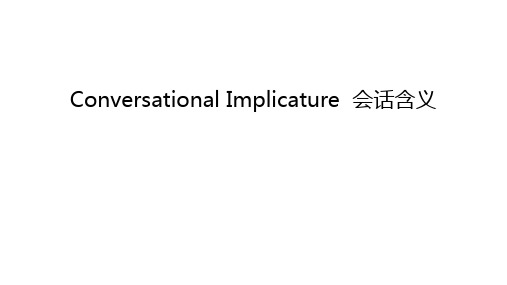
•Meon and interest among the figures of speech from scholars, since:
1. Its long history;
2. Grice: Metaphor can be treated as a special CI (from pramatics to explain metaphor), which is critisized as over simplify the issue and can only provide partial criterior for the illustration of metaphor;
Conversational Implicature 会话含义
Definition
• In 1967, American philosopher Grice put forward the Cooperative Principle: “Make your conversational contribution such as is required, at the stage at which it occurs, by the accepted purpose or direction of the talk exchange in which you are engaged” (Hu, 2001, p. 282-283).
3. The speaker confronts a kind of conflict (usually between 2Q), so s/he has to violate one principle in order to obey the other: (He Zhaoxiong, p.157)
Lecture 3-conversational implicature

3) Stevenson, Morris and others Meaning should be analyzed in terms of the use – context – intention. Furthermore, Stevenson proposes two kinds of meaning: a. Descriptive /conventional meaning -- meaning with no individual will/intention and attitude; b. Psychological/pragmatic meaning -- intended meaning, or meaning dependent on the intention and feeling of the speaker/hearer. (9) Children are children / 美国就是美国 Descriptively (or conventionally) (9) is meaningless with no individual will and attitude; pragmatically (or psychologically) it is very meaningful, given an appropriate context.
B. Analysis of meaning and intention Meaningn (natural meaning) -- X means (meant) that P entails P’; Meaningnn (non-natural meaning) – X means (meant) P, but it doesn’t necessarily entails P’. Meaningnn is actually a notion of intention. With the speaker’s intention, “the three rings on the bus” may mean the bus-driver wants to go home earlier, or the bus is leaving; “a cough” may mean a warning, or a request for silence, etc. It’s wrong to say absolutely that ‘The three rings on the bell’ means “the bus is full”, or “His cough” means “the teacher is coming now”.
2. conversational implicature会话含义
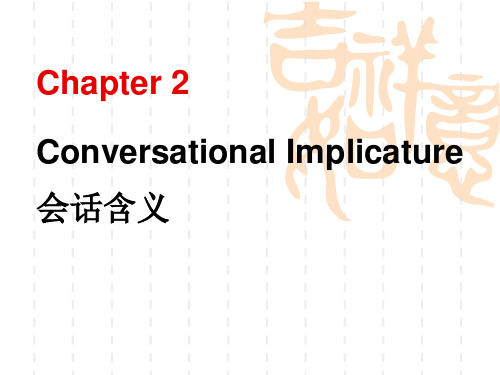
The theory of conversational implicature is the second major theory in pragmatics. Herbert Paul Grice began to formulate his ideas of this theory in the fifties. He delivered lectures -- the William James Lectures at Harvard in 1967. Part of the lectures – ―Logic and Conversation‖ was published in 1975.
4 possible situations where CP can be violated
quietly and unostentatiously violate CP (most likely to mislead)
opt out (e.g. I can’t say more. My lips are sealed.) face a dilemma (e.g. fulfill the quality maxim but violate the quantity maxim: -- Where does C live? -- Somewhere in the south of France.)
2) Do not make your contribution more informative than is required. 自己所说的话不能比所要求的更详尽
语言学conversational-implicature

Special features of implicatures
Cancellability 可取消性 Non-detachability 不可分离性 Calculability 可推导性 Non-conventionality 非规约性 Indeterminacy 不确定性
Cancellability
Non-conventionality
The literal meaning remains the same in all contexts, but conversational implicature will vary or be lost as the context changes.
add more clause to cancel the implicature. 1) Bill has four books. (Implicature: Bill has only four books and no more or no less.) Bill has four books, perhaps five or more. 2) A: There is a young lady with him, sir. She is crying. B: Pretty? A: I should say she is pretty, sir, in a quite inoffensive way. You are the cream in my coffee. In fact, I don't like cream.
语用学 5 Conversational_implicature II

Problems with Gricean maxims??
1• The maxims allow deriving all the possible implicatures
Post-Gricean developments
1. neo-Griceans (e.g. Horn 1984, 1988; Levinson 1995, 2000): rearranged Grice‘s maxims, reduced their number. Implicatures are explained as the result of the resolution of conflicts between maxims 2. Relevance Theory (Sperber and Wilson 1986; Carston 2002): reduced Grice‘s maxims to one cognitive principle.
2) I-principle Speaker's maxim (the Maxim of Minimization) Say as little as necessary, i.e. produce the minimal linguistic information sufficient to achieve your communicational ends (bearing the Q-principle in mind). Speaker: as efficient as possible 力求简洁 Recipient's corollary (the enrichment rule) Amplify the informational content of the speaker's utterance, by finding the most specific interpretation up to what you judge to be mintended point. Hearer: benefit as much as possible
- 1、下载文档前请自行甄别文档内容的完整性,平台不提供额外的编辑、内容补充、找答案等附加服务。
- 2、"仅部分预览"的文档,不可在线预览部分如存在完整性等问题,可反馈申请退款(可完整预览的文档不适用该条件!)。
- 3、如文档侵犯您的权益,请联系客服反馈,我们会尽快为您处理(人工客服工作时间:9:00-18:30)。
▪ Grice's work: ▪ he proposed different kinds of
implicatures and used that term as he claimed that 'implication' was not the right word. ▪ He reprinted many of his essays and papers in his valedictory book, Studies in the Way of Words.
▪ Significance: ▪ one of the foundations of the
modern study of pragmatics.
Categories of Implicature
Cooperative Principle
▪ Cooperative principle is a very important factor in the process of generating implicature.
Four Maxims of Cooperative Principle
▪ Quantity Maxim(数量准则) ▪ Quality Maxim(质量准则) ▪ Relation Maxim(关系准则) ▪ Manner Maxim(方式准则)
Quantity Maxim
▪ 1. Make your contribution as informative as is required (for the current perpose of the exchange).
▪ A:How are you? ▪ B:I'm dead. ▪ (possible speaker meaning:I'm very tired.)
▪ Husband: What should we buy for the kids? Wife: Let's veto I-C-E-C-R-E-A-M.
Conversational Implicatures
▪ A conversational implicature is an inference from the semantic content depending on context, speaker's intention, hearer's attitude and the mutual assumption.
▪ Grice:"Make your conversational contribution such as is required, at the stage at which it occurs, by the accepted perpose or direction of the talk exchange in which you are engaged." (Cole&Morgan, 1975:45)
▪ Grice's Theory of Conversational Implicature (1967) is "one of the single most important ideas in pragmatics" (Levinson, 1983)
examples for implicature
▪ Honesty is the first policy.
Relation Maxim
▪ Be relevant(关联的).
▪ 1) A: Mrs. Smith is so disgusting at the party. B: The curtain is very beautiful.
▪ 2) A: I am out of petrol. B: There is a garage at the corner.
▪ 2. Do not make your contribution more informative than is required.
▪ Michael has four dictionaries. ▪ Michael has five, six or even more
dictionaries.
Manner Maxim
▪ Be perspicuous: 1) Avoid obscurity of expression. 2) Avoid ambiguity. 3) Be brief (Avoid unnecessary prolixity) 4) Be orderly.
▪ Open the door. Go to the door, put the key into the lock, turn the key clockwise two times and push.
Quality Maxim
▪ Try to make your contribution true: ▪ 1) Do not say what you believe to be false. ▪ 2) Do not say that for which youuihong
Outline
▪ Grice ▪ Cooperative Principle ▪ Conversational Implicature
▪ Grice(1913—1988)
▪ a British-educated philosopher of language
▪ Study:
▪ The differences and relationships between speaker meaning and linguistic meaning.
▪ nonliteral speech as the outcome of a cooperative principle, and some derived maxims of discourse,speaker meaning
